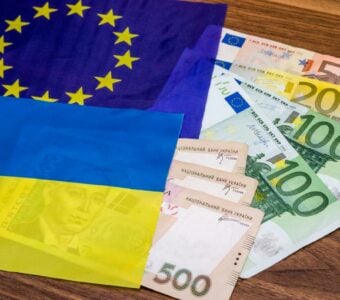G7 backs $50 bln Ukraine loan, secured by frozen Russian assets – Bloomberg

Photo: slovoidilo.ua
The G7 countries have reached a consensus on the United States' proposal to utilize frozen assets from Russia. This decision would provide Ukraine with crucial funding of up to $50 billion, safeguarding it from political fluctuations on both sides of the Atlantic.
Bloomberg reported that.
According to officials who are familiar with the talks, G7 countries are now largely in favor of a US plan to use any future funds from the Russian central bank, which amounts to $280 billion and is mostly frozen in Europe, to provide a loan to Kyiv.
The finance ministers from G7 countries are currently in talks at their meeting in Stresa, Italy, this week. Their goal is to come to a consensus on various options for their leaders to decide on at the meeting on June 13-15.
While the G7 is closing in on the general issues of the deal, many important details are still being discussed and need to be agreed upon, the agency's sources said on condition of anonymity.
These include:
- the exact mechanism of the loan,
- the size of the amount that will be raised upfront,
- and, most importantly, how the risk will be shared between the parties involved.
However, there is a consensus among the G7 countries that Ukraine needs more funding.
With the war showing no signs of abating and the Russian military offensive gaining momentum, the focus has shifted to providing medium-term aid to Kyiv and sending a strong signal to Moscow that the G7 allies are ready to support Ukraine as long as needed.
At stake is ensuring that Ukraine can continue to finance its defense and service its debt and that it can receive sustainable financial support in 2025.
The EU has already agreed to give Ukraine half-yearly earnings from frozen funds as they are earned. The US wants to use these earnings to give Kyiv a larger amount upfront, with the future income covering these expenses. The frozen assets are estimated to generate around $5 billion annually. If the G7 reaches an agreement, it will replace the EU's plan.
The advantage of the upfront income from assets will be to ensure a benefit for Ukraine regardless of the political uncertainty surrounding the US presidential election. Disagreements in Washington have already made it difficult for President Joe Biden to provide more aid to Ukraine, and his rival, former President Donald Trump, has expressed skepticism about Kyiv's support.
It should be noted that the G7 negotiators have been discussing for several weeks how best to use Russian assets worth about $300 billion, which were frozen after Moscow's invasion of Ukraine in February 2022.
The US hopes that all the G7 governments will participate in the provision of an advance loan to Ukraine for $50 billion, but Washington is ready to take over the entire loan on its own under the condition of EU guarantees that Russian assets will remain frozen.
For reference:
On February 24, the Group of Seven (G7) countries released a statement confirming that they would keep Russian assets frozen in their jurisdictions until the end of Russia's full-scale war against Ukraine.
It is worth adding that the European Union has prepared a legislative proposal, according to which Ukraine will start receiving profits from the blocked assets of the Russian Central Bank already in July: the funds will be directed to the supply of weapons and the development of the defense industry.
On March 19, the Head of Diplomacy of the European Union, Josep Borrell, proposed to use 90% of the revenues from the Russian Federation's assets frozen in Europe to purchase weapons for Ukraine through the European Peace Fund.
According to open information, Euroclear currently has 192 billion euros of Russian Central Bank assets on its balance sheet. The EU is looking for legal mechanisms to deal further with these frozen resources and the interest accrued on them, which has reached €5 billion over the past two years.

























































